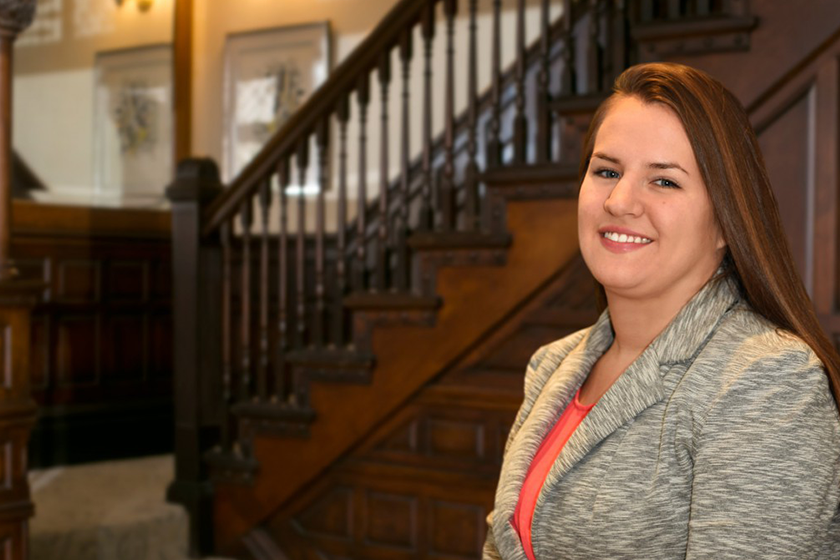I have been fortunate to work with many different social justice organizations in my short career, but some of the experiences that have been most dear to me are those that I have had while working with people who are charged with crimes, people who are incarcerated, and people who live with criminal records.
I co-founded and currently chair the Temple National Lawyers Guild (NLG) Expungement Project. I coordinate with Community Legal Services of Philadelphia (CLS) to staff intake clinics throughout the city. With my student committee, I recruit, train, and organize law student volunteers to assist the advocates from CLS with their criminal record expungement cases. I also serve as an external coordinator for the Restorative Justice Project at the State Correctional Institution (SCI) at Graterford. In this role, I partner with Haverford College students, faculty, staff, and a committee of brilliant men who are incarcerated at SCI-Graterford. I coordinate volunteers on the “outside,” serve as a liaison between Graterford and the Pennsylvania Office of the Victim Advocate (OVA), and participate in two-day and 10-week workshops about restorative justice values and practices. Our goals are to consider the impact of harm in communities, families, and on the lives of victims and people have caused harm. For me, it has been an opportunity to discuss how the law often falls short in addressing harm, and how it sometimes can cause more damage to communities and families in the long-term.
Before law school, I worked at Community Legal Services (CLS) and the National Clearinghouse for the Defense of Battered Women (NCDBW). As a paralegal and legal intern at CLS, I discovered a passion for working with people who are low-income and who have been involved in the criminal legal system. I worked primarily with clients whose criminal records created barriers to long-term, meaningful employment. I came to recognize how criminal records affect other aspects of those clients’ lives – especially in public benefits, housing, and family law. While at NCDBW, I learned a great deal about the dynamics of intimate partner violence and how survivors of battering can become involved in the criminal legal system as defendants. I had the opportunity to speak with many survivors of intimate partner violence throughout the years, many of whom were incarcerated or charged with crimes. At both of those organizations, I came to see how deeply the criminal legal system has hurt low-income communities, especially communities of color. I began to see that working with people who have been impacted by the criminal legal system is part of a broader mission of economic and racial justice.
“I hope that my work with the Temple NLG Expungement Project and the Restorative Justice Project at SCI-Graterford has shown other students (both undergraduates and law students) that they can be agents of change, even when it may feel like their work is just a drop in the proverbial bucket.”
This summer, I worked at the Office of the Public Defender of New Jersey in Camden, NJ. I had the opportunity to represent clients in bail hearings, arraignments, guilty pleas, sentencings, and even in a motion to suppress. I found a new dimension to my passion for advocacy in the criminal legal system: the opportunity to appear in court on behalf of a client, and to be the only person in the courtroom who is there to defend them zealously no matter what.
The work that I do is centered on the limitations of the criminal legal system. There are profound unanswered questions that stem from the criminal legal process and the systemic impacts it has on people’s lives long after their cases have concluded. Work related to the criminal legal system started calling to me when I was a senior at Haverford College. I took an Inside/Out course in the fall of that year in one of the Philadelphia County Jails. The “outside” and “inside” students all share the same course materials and co-learn in the course. I loved the emphasis on acknowledging the humanity and personhood of the “inside” students, where so often the rest of the world recognized them only with labels: “criminals,” “felons,” “inmates,” etc. That is the spirit I have tried to carry with me throughout my young career.
My clients and my colleagues (both on the “inside” and the “outside”) deserve dignity and respect. When I think about the impact I have had on my clients, the law school community, and the larger communities that I am a part of, I hope that at the very least I have offered them an opportunity to consider their part in a movement to empower those who have been marginalized by the criminal legal system. I try to offer information to clients (or clients of the organizations for whom I have worked) to equip them with the legal knowledge to make informed decisions about their case, but also to understand how they can enable their neighbors, families and friends to create change. I hope that my work with the Temple NLG Expungement Project and the Restorative Justice Project at SCI-Graterford has shown other students (both undergraduates and law students) that they can be agents of change, even when it may feel like their work is just a drop in the proverbial bucket. We can all be part of a fight for economic and racial justice. The first step is recognizing that every person has the potential to grow and the right to be treated with dignity and kindness.


